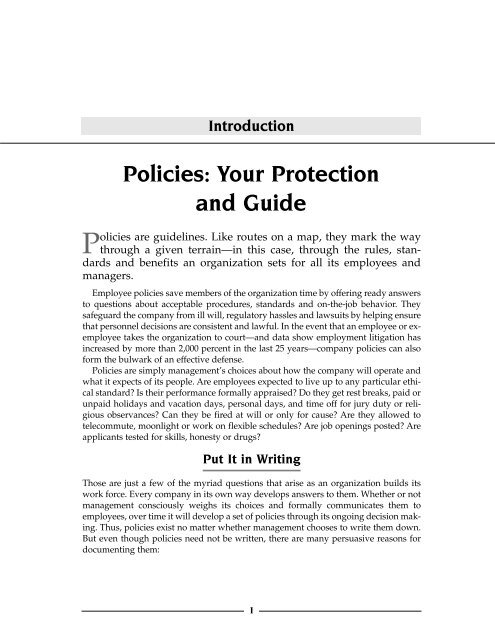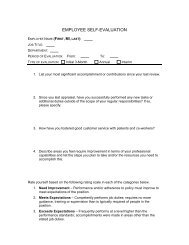sample policies
sample policies
sample policies
Create successful ePaper yourself
Turn your PDF publications into a flip-book with our unique Google optimized e-Paper software.
Introduction<br />
Policies: Your Protection<br />
and Guide<br />
Policies are guidelines. Like routes on a map, they mark the way<br />
through a given terrain—in this case, through the rules, standards<br />
and benefits an organization sets for all its employees and<br />
managers.<br />
Employee <strong>policies</strong> save members of the organization time by offering ready answers<br />
to questions about acceptable procedures, standards and on-the-job behavior. They<br />
safeguard the company from ill will, regulatory hassles and lawsuits by helping ensure<br />
that personnel decisions are consistent and lawful. In the event that an employee or exemployee<br />
takes the organization to court—and data show employment litigation has<br />
increased by more than 2,000 percent in the last 25 years—company <strong>policies</strong> can also<br />
form the bulwark of an effective defense.<br />
Policies are simply management’s choices about how the company will operate and<br />
what it expects of its people. Are employees expected to live up to any particular ethical<br />
standard Is their performance formally appraised Do they get rest breaks, paid or<br />
unpaid holidays and vacation days, personal days, and time off for jury duty or religious<br />
observances Can they be fired at will or only for cause Are they allowed to<br />
telecommute, moonlight or work on flexible schedules Are job openings posted Are<br />
applicants tested for skills, honesty or drugs<br />
Put It in Writing<br />
Those are just a few of the myriad questions that arise as an organization builds its<br />
work force. Every company in its own way develops answers to them. Whether or not<br />
management consciously weighs its choices and formally communicates them to<br />
employees, over time it will develop a set of <strong>policies</strong> through its ongoing decision making.<br />
Thus, <strong>policies</strong> exist no matter whether management chooses to write them down.<br />
But even though <strong>policies</strong> need not be written, there are many persuasive reasons for<br />
documenting them:<br />
1
















